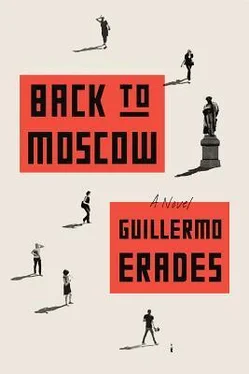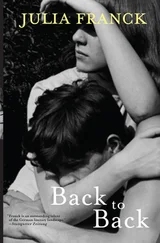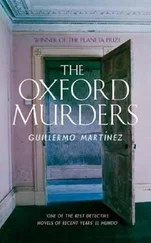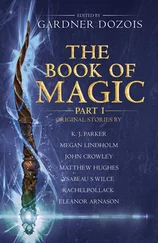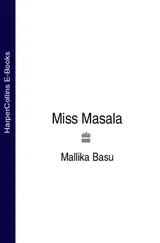That was a pity, I thought, because it would have been nice to have at least one window overlooking the cafés in Kamergersky.
Colin asked a few questions, out of politeness, I imagined, as I could see he was disappointed. He knocked on the tables, pulled open a few drawers. I noticed a bunch of framed pictures crammed on top of the piano and a family portrait hanging by the entrance. After a few minutes we thanked the old couple, Tatyana told them she would be in contact, and we left the building.
‘What the fuck,’ Colin said once we were in the street. ‘This is their own flat. These people live here.’
Tatyana seemed confused. ‘Of course,’ she said, ‘but they would move out if you rented it.’
‘But I’m looking for an empty flat.’
The three of us stopped beneath Chekhov’s statue.
‘It would be an empty flat if you took it,’ Tatyana said, blushing. ‘The owners would move out.’
‘Out where?’
‘I don’t know,’ Tatyana said, ‘maybe to live with their family in the suburbs, or in a dacha, if they have one. It’s a common situation, these people are the old intelligentsia who had good connections in the Communist party and occupied the best flats in the centre. With the perestroika they were allowed to privatise their flats but they now live on very small pensions. Life is very expensive in Moscow. They have to move out and live off the rent.’
Colin seemed distressed. ‘I would be kicking them out of their own place.’
‘They like foreigners as tenants,’ Tatyana said. ‘They know you pay well and won’t stay for ever. If you rent their flat you’ll be doing them a favour.’
‘I was thinking about something more modern,’ Colin said. ‘I don’t want to move into someone else’s apartment.’
Tatyana forced a smile. ‘Don’t worry,’ she said, ‘we’ll find something. There are good apartments in this area, renovated to Western standards.’
I felt sorry for Tatyana, who’d come all the way to show us the apartment and, I guessed, worked on commission. Her eyes looked teary from the cold.
‘This is a very nice area,’ I said.
‘It is,’ Tatyana said. Then, pointing at the MKhAT, ‘This is a very famous theatre in Russia. Stanislavsky, Chekhov, you know. See the emblem above the entrance?’
‘The bird?’ I asked.
‘It’s a seagull, after Chekhov’s play.’
I could hear in the humble way she spoke that Tatyana was not from Moscow.
‘I’m also looking for a flat,’ I heard myself saying.
Colin looked at me, at first surprised, then grinning.
‘You are?’ Tatyana asked.
‘Yes, my flat is small. I could move somewhere bigger.’
Tatyana smiled. ‘Maybe I can also try to find something for you.’
She handed me her card, and we agreed to keep in touch. We said goodbye and shook hands. She then walked away, turned left at Tverskaya, and disappeared in the direction of Okhotny Ryad.
I WAITED IN THE MIDDLE of Pushkinskaya, observing how the snow that had covered the streets for months was now melting away, revealing the tarnished skin of the city. Without its white layer, Moscow looked exposed, somewhat uncomfortable, like a dyev the morning after — too much light and no make-up.
I saw Tatyana crossing the street, marching towards the centre of the square. She was wearing the same black coat and yellow hat. A couple of hours after she’d given me her card, I’d sent her a message asking if she wanted to meet for a drink.
I took her to Maki, a new café five minutes away from Pushkinskaya. Decent music, polite waitresses, dim lights — Maki was the closest thing to a modern European café. By now I preferred it to Pyramida. The young clientele was better dressed than the students in Project OGI but not as pretentious as the elitni tusovka of Vogue.
We sat at one of the small tables, checking out the menu. I asked for a bottle of red wine. When the waitress came back with the wine, Tatyana remained undecided, her eyes fixed on the menu as if she were reading a book. She looked at me and blushed.
‘The mushroom soup is very good,’ I said.
‘Great,’ she replied with relief, ‘I’ll have that.’
‘What else?’
‘I’m not that hungry.’
‘Salad, maybe?’
‘Davay,’ Tatyana said. ‘That would be nice.’
I ordered two mushroom soups and two Caesar salads.
At first Tatyana wasn’t very talkative but, after a swiftly drunk glass of wine, she became more relaxed. She told me that she came from Novosibirsk and had been living in Moscow for six months. She liked Moscow but she missed her family, especially her babushka, who was the one who had really raised her. It felt good sitting in Café Maki with Tatyana. I imagined everybody around us would be admiring her blonde, curly hair and her eyes, so green and perfect. She was clearly unaware of it, but Tatyana was without doubt the prettiest girl in the café.
‘I’m happy that my aunt found me a job in Moscow,’ Tatyana said. The aunt lived in a small town two hours away by elektrichka and Tatyana dutifully visited her every weekend. ‘Back in Novosibirsk it’s impossible to find work that pays decently.’
What she liked best about the capital, Tatyana said as our plates of soup were laid in front of us, was the culture on offer.
‘There are so many things going on in Moscow’s theatres,’ she said. ‘The classics, but also very nice new musicals. If I had the money I would go every night.’ She smiled, her lips closed, probably conscious of the gap between her front teeth.
As Tatyana was talking about her interests, I took my red notebook out of my backpack and placed it to the right of my soup plate. I took some notes — Novosibirsk, babushka, aunt, theatre.
‘What’s that?’ Tatyana asked.
I told her about my research project, how it was not just about reading books, but also about getting to know what Russians thought about life.
‘But I don’t have any interesting thoughts about life,’ Tatyana protested.
‘That’s an interesting thought in itself,’ I said, scribbling in the notebook.
Tatyana smiled. Her face was red. ‘Can I have a look?’
‘Sure,’ I said, pushing the notebook towards her side of the table.
She turned the notebook round, glanced at it in silence. ‘But it’s in English.’
‘Of course.’
Then she started to read slowly, sliding her finger under the lines, in heavily accented English. She started from the top of the page.
‘“When you saw the yellow tape, you knew spring was around the corner.”
‘What does it mean?’
‘Just random thoughts.’
She continued reading.
‘“Black coat. Yellow woollen hat. Apple green eyes.”’ She laughed. ‘You are so funny.’
I kept refilling her glass of wine. When the salad arrived, I ordered a second bottle.
Tatyana wanted to know what I thought about Russia, as a foreigner.
When we were done with the salads I suggested we share a plate of blinis with preserved strawberries and mascarpone.
‘Davay,’ she said.
The blinis arrived and I slid the plate into the middle of the table.
‘I didn’t know what mascarpone was,’ Tatyana said, her mouth still half full. ‘But I like it, it’s just like thick smetana.’
After dessert, we finished the bottle of wine, I paid the bill and we walked out into the dark street.
‘Thanks for dinner,’ Tatyana said. ‘It was lovely.’
‘Let’s walk to the metro,’ I suggested.
She looked at her watch. ‘I think I’m a bit drunk.’
It was colder now and, as we walked in silence back towards Pushkinskaya, I had to repress the urge to put my arm around Tatyana. Reaching the square, we descended into the perekhod but, instead of going all the way to the metro entrance, we climbed the stairs out into the street again, and stood next to Pushkin’s statue, where we had met earlier.
Читать дальше
